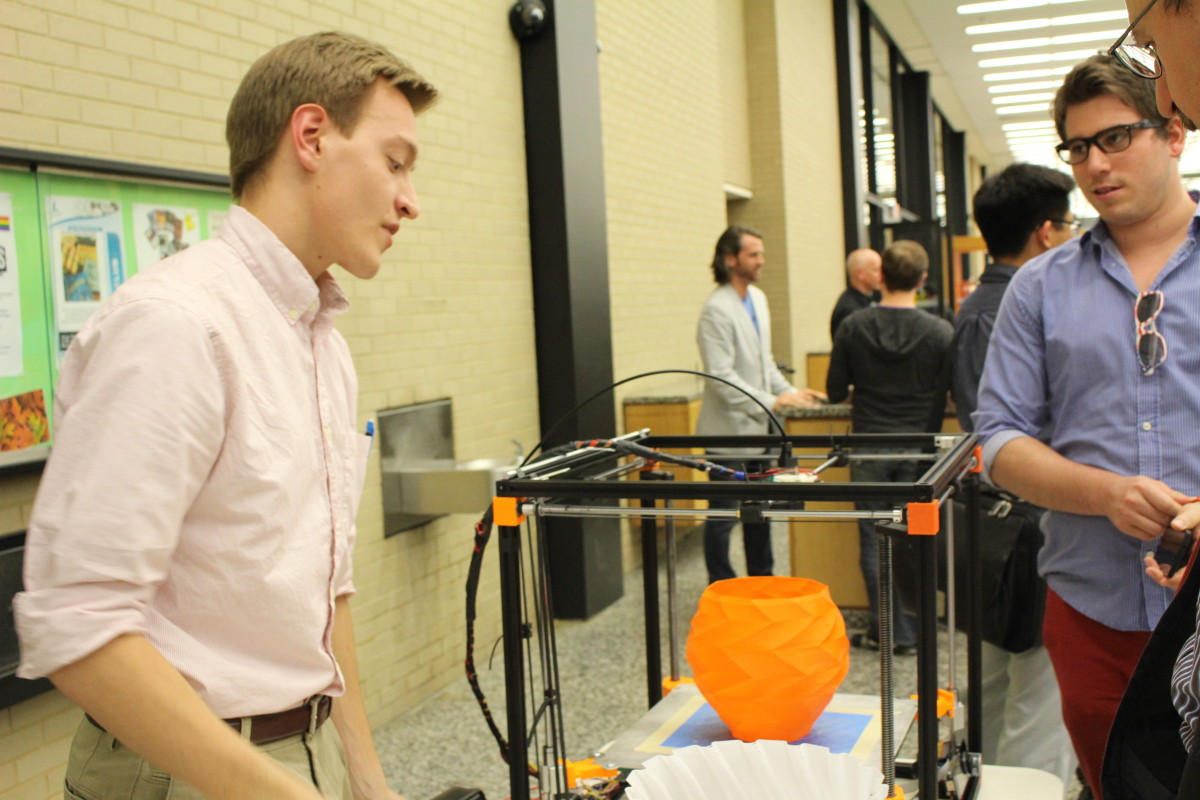Tuesday’s DC Tech Meetup was an opportunity to find out what’s cooking at local colleges and universities.
The “college edition” featured demos from young entrepreneurs who might have skimped on their homework, but came to the MLK Library fully prepared, with sleek apps and presentations in tow.
Here are the eight startups that showed up.
- Happening is an events app that “doesn’t discriminate” between professional and social get-togethers, explained founder Max Friedman. It also makes events recommendations based on our history, like “a Pandora for events.” Not sure that’s your jam? “If you like it, swipe right, if you don’t, swipe left.” Launched last week in iOS, the app is live at George Washington University and Boston University and has collected nearly 1,000 downloads and 10,000 swipes, Friedman said.
- Created last year by three former Howard University students, Rhombus is actually not an app. The concept, explained cofounder Taiwo Oyeniyi, is to “allow merchants to talk to customers [and receive payments] via SMS in real time.” Text messages have practically no learning curve, he said, and have a “larger footprint, much larger than any app out there.” Rhombus levies 2.9 percent off each transaction. The service has currently signed up about 1,000 users — merchants and customers combined.
- Readybox creator Brett Potter is a master of the honest humblebrag. That’s because the 3D printer he created during endless nights spent in the University of Maryland’s rapid prototyping lab, where he works as lab manager, has the ambition to be the fastest prototype in the industry. Potter managed to find a system where the extruder system (the part that pushes the liquid material out) applies more tork to the filmant. It can push harder and faster, and the motion system can keep up, he said. “One late night, I decided to try it, and it worked.” The technology also “improves the detail, which I wasn’t expecting, but it happened,” he said. He’s now preparing to file a patent for the technology. The Readybox has a speed of 350 millimeters per second, and will cost $2,000. It is undergoing its final touches and should be ready by the end of the summer, said Potter.
- Syrch is LinkedIn, Facebook and Gchat all rolled into one. The sleek, green-lined interface includes a calendar and an online tutoring platform, which will fund the company. When cofounder and Georgetown University student Michael Orso was asked about the app’s looming, giant competitor, he responded breezily that students would appreciate the less clunky look and feel of Syrch: “The BlackBoard name is sort of tarnished,” he said. The app will expand this summer to George Washington University, American University, the University of Maryland and potentially the University of Southern California and Boston University. Syrch plans to launch a mobile app in August.
- PopHotel, the brainchild of four Georgetown MBA students, aims to “convert low-cost office space into affordable hotel rooms,” explained cofounder Clyde McGraw. The company is targeting class B offices, and will start by advertising listings through existing platforms like Airbnb or Hotels.com.
- BitGrid, the “cloud collaboration software for municipal utilities” that won second place at last year’s DC Challenge Cup at 1776, has formed a new partnership with the GIS mapping company Esri, said CEO Charles Taylor, a GW senior. Plus, it’s also preparing a pilot “with a state down South,” he added.
- Founded by grade-school pals Brendan Doherty and Phil Olive, Storganize is “looking to take the self out of self-storage.” The company will carry your boxes, tag items in your stoirage unit and “make that inventory for you.” It will have its full-service launch in the early summer. Doherty works full-time on Storganize, and Olive is a graduate student at American University, where the company is a member of the incubator program there. Storganize won an AU pitch competition in November. Doherty describes the duo as serial entrepreneurs: “In eight grade,” he said, “we would go to Safeway, we’d buy a bunch of soda [and] sell it at a marked-up price” to classmates.
- Spiin, an electrical bike-sharing vehicle created by George Mason University students, will include several nifty features, including a 30-mile range and 20 mph speed, the possibility to charge it up through a mini-USB cord and a GPS-enabled lock.







